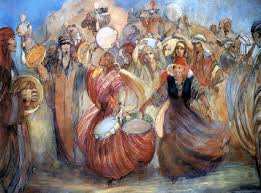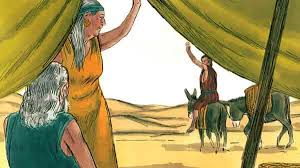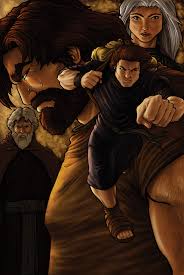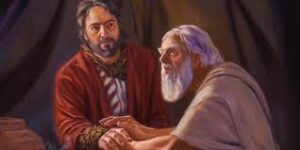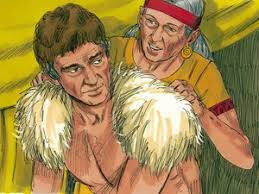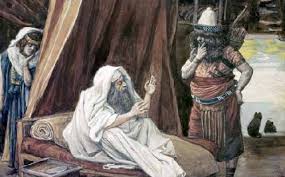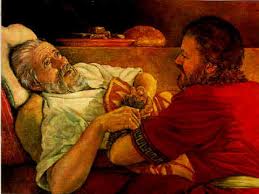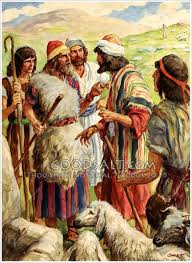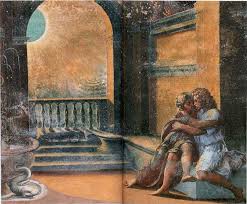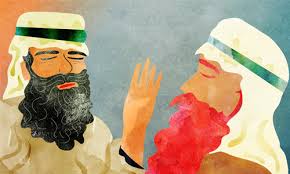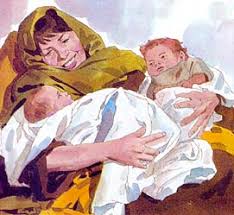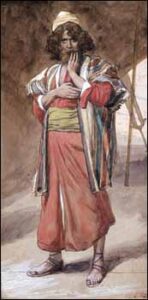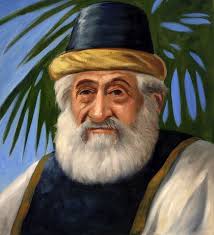Hd – Jacob Saw a Stairway with Angels Ascending and Descending 28: 10-22
Jacob Saw a Stairway
with the Angels of God Ascending and Descending
28: 10-22
Jacob saw a stairway with the Angels of God ascending and descending DIG: What is so remarkable in ADONAI’s display of grace? Why does God meet Jacob unsolicited and without criticism?
REFLECT: Do you think God still speaks through dreams? What are the inherent dangers of relying on dreams for guidance? Do you believe, beyond any doubt, that the Lord will care for you?
Parashah 7: vaYetze (He went out) 28:10-32:2
(see my commentary on Deuteronomy, to see link click Af – Parashah)
The Key People include Jacob, Rachel, Laban, Leah, handmaids and sons. The main character of parashah vaYetze is Jacob. This portion begins as Jacob is busy packing his bags to flee from his angry brother, Esau; and closes with Jacob fleeing again, but this time from his angry father-in-law and uncle, Laban. Amid his journeys, we see Jacob pitted in a battle of wits with his father-in-law Laban in whom there is much guile.
The Scenes include Beersheba, Bethel, Haran, Galeed, and Mahanaim.
The Main Events include Jacob’s escape, his dream of angels ascending and descending on a stairway to heaven, God’s promise of family and land, Jacob’s response to build an altar and tithe, 20 years of work (7 for Leah, 7 for Rachel, and 6 for livestock), 11 sons born to him, livestock increase, dream warning Jacob to return home, a fast getaway while Laban chases, the family gods stolen by Rachel, the covenant between Jacob and Laban at Galeed, and angels greeting Jacob at Mahanaim.
Jacob left Beersheba and set out for Haran with only a staff in his hand (28:10). He had spent most of his life in Beersheba (22:19, 26:33, 28:10). It was five hundred miles to Haran, and even though he probably had a camel or a donkey to ride on, it would take him weeks to get there. Bethel is twelve miles north of Jerusalem and Beersheba, which is thirty miles south of Jerusalem. So Jacob (Hebrew: Ya’akov) covered about forty miles his first day. Wow, he really wanted to get away from Esau in a hurry!
When he reached a certain place, he stopped for the night because the sun had set. It almost sounds like Jacob reached this certain place by chance. But nothing could be further from the truth. The LORD led him there, whether Ya’akov knew it or not. He called the place, Beit-El or Bethel, which means the house of God. Many years earlier his grandfather Abraham had built an altar to ADONAI there as an act of public worship (12:8). It is twelve hundred feet above sea level in the hills, and it is a bleak and desolate place. Yet this would become the high point in his spiritual life.
Taking one of the stones there, he put it near his head and lay down to sleep (28:11). He didn’t really use it as a pillow; the Hebrew literally reads near his head. The same terminology is used in 1 Samuel 26:7, where Saul fell asleep with his spear stuck in the ground near his head. What do you think Jacob was feeling? He was probably lonely and homesick. As far as we know, this was his first night away from home and Jacob thought he was all alone. How wrong he was. The point of the account is that God was present with him wherever he went, and chose this place to make Himself known to Jacob. The means He used was a stairway.
It was only when he was asleep, needy and helpless, that God revealed Himself.451 He had a dream in which he saw a stairway (28:12a), asullam, which appears only here in the Hebrew text. Ya’akov trusted the promises of the LORD all his life. He worshiped ADONAI and prayed to Him regularly. But God had never actually appeared and spoken to him as He had to his grandfather Abraham and his father Isaac. But on this night Jacob would meet ADONAI as a theophany, in the form of a dream. A theophany is a pre-incarnate appearance of Jesus Christ. It was obvious that this was no ordinary staircase.
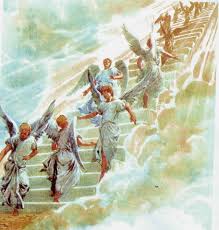
This stairway was resting on the earth, where Jacob was, with its top, literally head, reaching to heaven, where ADONAI was. So the dream pictures Ya’akov having access to heaven. And the angels of God were there with him (28:12b). In the book of Genesis, the phrase, the angels of God, is found in only two places, here and 32:1. What is significant in both instances is the timing. Here, the angels of God are mentioned as Jacob departs from the Land, and in 32:1 they are mentioned again as he is returning to the Land. These angels of God are pictured as ascending and descending on a stairway (28:12c).
Almost two thousand years in the future from Jacob’s day, a devout Israelite named Nathanael was meditating under a fig tree on God’s word. In those days it was impossible for everyone to have a copy of the Scriptures so they spent a lot of time memorizing it, and then meditating on it. The rabbis said that the best place to meditate and receive a blessing from the LORD was under a fig tree. In fact, some rabbis would teach under a fig tree because they said the Scriptures could be better understood there.
When Jesus saw Nathanael approaching, He said to him: Here is a true Israelite, in whom there is nothing false. Nathanael wanted to know how Yeshua knew him. He answered: I saw you while you were still under the fig tree before Philip called you. Then Nathanael said a very curious thing. He said: Rabbi, You are the Son of God; You are the King of Israel (Yochanan 1:47-49). Nathanael did not believe that Jesus was the Son of God simply because He knew that he was mediating under a fig tree. Today, if someone said, “I saw in a vision that you were at Temple on Shabbat,” you wouldn’t think he was a prophet, because Temple is where you would expect to find the righteous of the TaNaKh on Shabbat.
So during the time of Christ you would have expected to find a Jew meditating under a fig tree. So what made Nathanael believe in Yeshua? It was the first statement: Here is a true Israelite, in whom there is nothing false. Jesus knew the exact chapter Nathanael was meditating on. It was Genesis 28. But if Nathanael was a true Israelite in whom there was nothing false, by implication, who was the Israelite in whom there was much guile (NKJ)? It was Laban, Jacob’s deceitful uncle (28:2-5). How can we be sure Yeshua knew Nathanael was meditating on Genesis 28? Jesus then said: You shall see heaven open, and the angels of God ascending and descending on the Son of Man (John 1:51). This was the exact vision that Jacob had seen in his dream. In other words, Jesus claimed to be the stairway, the only means to get from earth to heaven: For there is one God and one mediator between God and men, the man Yeshua the Messiah (First Timothy 2:5).
Then ADONAI reconfirms the provisions of God’s covenant with Jacob’s grandfather Abraham. There above it stood the LORD, and He said to Ya’akov, “I am ADONAI the God of your father, or descendant, Abraham and the God of Isaac” (28:13a). There were four aspects of the Covenant. First, I will give you, Jacob, and your descendants the land on which you are lying (28:13b). The mere mention of descendants means that Jacob will succeed in finding a wife.
Second, Your descendants will be like the dust of the earth, and you will spread out to the west and to the east, to the north and to the south (28:14a). He and his future wife will be very fruitful and will have so many descendants, that they will be as numerous as the dust of the earth. Third, he had the promise of Gentile blessing: All peoples on earth will be blessed through you and your offspring (28:14b).
Fourth, there are personal promises to Jacob. ADONAI’s presence: I am with you. El Shaddai’s protection: I will watch over you wherever you go. The LORD’s promise: I will bring you back to this land. And finally, God’s personal commitment: I will not leave you until I have done what I have promised you (28:15). Notice that ADONAI did not say anything negative to him at all because Jacob was a righteous man (25:27). If you are a believer in Jesus Christ, the fact that He will not leave you until He has done what He has promised you is probably the most precious promise that you can get out of the Bible.
Ya’akov, the man, may not have understood the full implications of his remarkable dream, but he surely could understand that there was communication between man and God, and that the LORD would provide the means by which man could be restored to Him. Personally, he learned that beyond any doubt, ADONAI would care for him and that regardless of future circumstances, El Shaddai would lead him and fulfill all His promises.452
After ADONAI had finished speaking, Jacob awoke from his sleep, although it seemed to him to be much more than an dream. Jacob’s reaction was such that he believed that YHVH had actually appeared and spoken to him. When he ran away from home, he had had a limited view of the LORD. He thought that when he ran away from home, he was running away from God. But he found that he had not left God back home. Jacob exclaimed: Surely ADONAI is in this place, and I was not aware of it (28:16).453 He was afraid in the sense that he started to understand the power of Elohim. Jacob was growing in his faith because the fear of the LORD is the beginning of wisdom (Proverbs 9:10). He said: How awesome is this place! This is none other than the house of God; this is the gate of heaven (28:17).
This was Jacob’s first encounter with God. His was not a mature faith like Abraham’s, but nonetheless, it was a step in the right direction for Jacob. After all, Abraham had several lapses of faith before he became a mature believer. The LORD had taught him as he matured, and He would do the same with Ya’akov. He does the same with us.
Jacob established several motifs pertaining to Jewish worship here at Bethel. The most notable is the memorial. Early the next morning Ya’akov took the stone he had placed near his head and set it up, literally stood it up, as a pillar. He did not have an animal to sacrifice, but he did make a drink offering (Exodus 29:40-41; Leviticus 23:13 and 18) by pouring oil on top, literally the head, of it (28:18). This was the first use of a drink offering in the Scriptures. Later, under the Torah, the drink offering would always be made of wine and would symbolize joy. It would not be offered alone, but always in conjunction with the sweet-savor offerings (Numbers 15:1-13), especially the burnt offering and its accompanying meal offering. It was never to be offered with the sin or guilt offerings because there would be no joy for ADONAI in Messiah’s sufferings when He was made sin upon the cross (see my commentary on Exodus, to see link click Fb – The Five Offerings of the Tabernacle: Christ, Our Sacrificial Offering).
Setting up stones as a pillar also became important from this time on. Memorials are different from altars. They were set up to recall where God had dealt with man, so that people would learn about Him when they asked: What do these stones mean (Joshua 4:6)? Moses would set up twelve stone pillars (Exodus 24:4). Jacob called the place Bethel, though the city used to be called Luz (28:19). Luz, its original name, meant separation, while Beit-El or Bethel (its new name), means the House of God. ADONAI calls us to be separate from the world, but in leaving the world we enter His house.454
Jacob’s vow was another motif. Then Ya’akov made a vow, the first recorded in Scripture, saying: since God will be with me and will watch over me on this journey I am taking and will give me food to eat and clothes to wear so that I return safely to my father’s house, then ADONAI will be my God. And this stone that I have set up as a pillar will be God’s house; in other words, this will be the place where Jacob will return to worship the LORD (28:20-22a). About twenty years later, the LORD would tell Jacob to return to Bethel (see Ih – Jacob’s Journey to Bethel).
Tithing was another motif. In addition to setting up stones as a pillar, Jacob responded to the appearance of ADONAI by making a vow of service to Him, saying: And of all that you give me, I will give you a tenth (28:22b). Like his grandfather Abraham, who had given tithes to Melchizedek (14:40), Jacob acknowledged that everything he had belonged to God. These were both voluntary gifts. God did not command them. Later, tithing would become an obligation under the Torah (Leviticus 27:30; Numbers 18:21-24). Today, believers should tithe and it should be done cheerfully and gratefully, not grudgingly or with a selfish attitude (Second Corinthians 9:7). The New Covenant contains no command for specified amounts or percentages of giving. We need to support those who feed us spiritually (Matthew 10:5-11; Luke 9:1-5; John 12:6 and 13:29; First Timothy 5:17-18), but after that the percentage we give will be determined by the love of our own hearts and the needs of others (see the commentary on The Life of Christ Do – When You Give to the Needy, Do Not Do It to be Honored by Others). We do not have to take on the yoke of the Torah.
It seems, then, the main reason for this dream was to encourage Jacob in his journey out of the Promised Land. It assured him that the LORD was to be with him in his time in Haran and that, by His sovereign grace, He would bring him back home to Canaan. Judging from what Jacob would experience in Haran, he would need all the encouragement he could get!
In Jacob’s dream, ADONAI came to earth. Indeed, the Bible often repeats this refrain. But God comes to other runaways as well. This is, in fact, the LORD’s defining purpose; He comes to rebellious people to be with them and to save them. When El Shaddai finally decided to become a Person to seek and save the lost, He was given the name: God with us (Mt 1:23). Jacob was forced to respond to ADONAI’s coming, and so are we.455



